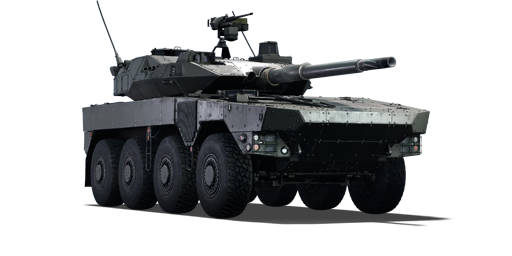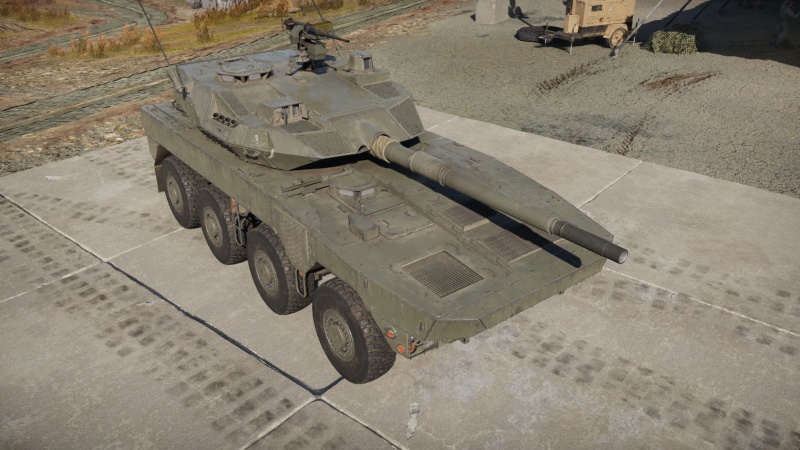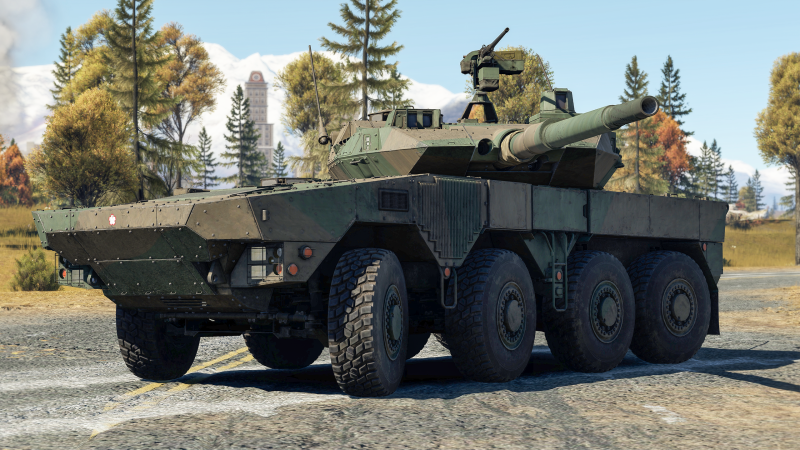Type 16
Contents
Description
The Type 16 is a rank VII Japanese light tank with a battle rating of 9.7 (AB/RB/SB). It was introduced in Update 1.89 "Imperial Navy".
General info
Survivability and armour
Describe armour protection. Note the most well protected and key weak areas. Appreciate the layout of modules as well as the number and location of crew members. Is the level of armour protection sufficient, is the placement of modules helpful for survival in combat? If necessary use a visual template to indicate the most secure and weak zones of the armour.
Armour type:
| Armour | Front (Slope angle) | Sides | Rear | Roof |
|---|---|---|---|---|
| Hull | 15 mm Upper glacis (80°)
5 Lower Front Plate (45°) |
15 mm Top (0°) 10 mm Bottom (0°) |
20 mm (9°) | 5 - 20 mm |
| Turret | 5 - 25 mm Turret front (0°)
5 mm Spaced armor (61°) |
25 mm (0°)
5 mm spaced armor (25°-38°) |
15 mm (0°) | 5 - 25 mm |
| Cupola | 25 mm | 25 mm | 25 mm | 5 (Center) - 25 (Outer) mm |
Notes:
Mobility
| Game Mode | Max Speed (km/h) | Weight (tons) | Engine power (horsepower) | Power-to-weight ratio (hp/ton) | |||
|---|---|---|---|---|---|---|---|
| Forward | Reverse | Stock | Upgraded | Stock | Upgraded | ||
| Arcade | 111 | 41 | 26 | 810 | 1,088 | 31.15 | 41.85 |
| Realistic | 100 | 37 | 504 | 570 | 19.38 | 21.92 | |
Modifications and economy
Armaments
Main armament
| 105 mm JSW | Turret rotation speed (°/s) | Reloading rate (seconds) | |||||||||||
|---|---|---|---|---|---|---|---|---|---|---|---|---|---|
| Mode | Capacity | Vertical | Horizontal | Stabilizer | Stock | Upgraded | Full | Expert | Aced | Stock | Full | Expert | Aced |
| Arcade | 40 | -6°/+15° | ±180° | Two-plane | 26.42 | 36.56 | 44.40 | 49.10 | 52.24 | 8.7 | 7.7 | 7.1 | 6.7 |
| Realistic | 17.85 | 21.00 | 25.50 | 28.20 | 30.00 | ||||||||
The primary armament of the Type 16 MCV is a 105 mm JSW cannon, derived from the L7A3 much like many other NATO/BLUFOR vehicles. It features the standard selection of APFSDS, HESH, HEAT-FS, and smoke, in addition to the Type 93 shell, one of the better APFSDS at this rank. While you will struggle against 10.0 and 10.3 main battle tanks from the front, your gun is very effective against everything else. The HEAT-FS is especially effective against lightly armoured vehicles - it will often overpressure where the APFSDS will not deal sufficient damage.
When fighting MBTs, you should try to get side on shots. Type 93 will struggle against most 10.0s and 10.3s from the front, but from the side it will act like any other fin round. This is especially effective against "T series" tanks like the T-64, T-72, and T-80.
Ammunition
| Penetration statistics | |||||||
|---|---|---|---|---|---|---|---|
| Ammunition | Type of warhead |
Penetration @ 0° Angle of Attack (mm) | |||||
| 10 m | 100 m | 500 m | 1,000 m | 1,500 m | 2,000 m | ||
| Type 91 | HEATFS | 400 | 400 | 400 | 400 | 400 | 400 |
| Type 75 | HESH | 127 | 127 | 127 | 127 | 127 | 127 |
| M735 | APFSDS | 353 | 350 | 342 | 333 | 322 | 312 |
| Type 93 | APFSDS | 405 | 403 | 396 | 388 | 378 | 370 |
| Shell details | |||||||||
|---|---|---|---|---|---|---|---|---|---|
| Ammunition | Type of warhead |
Velocity (m/s) |
Projectile Mass (kg) |
Fuse delay (m) |
Fuse sensitivity (mm) |
Explosive Mass (TNT equivalent) (g) |
Ricochet | ||
| 0% | 50% | 100% | |||||||
| Type 91 | HEATFS | 1,150 | 10.5 | 0.05 | 0.1 | 1,270 | 65° | 72° | 77° |
| Type 75 | HESH | 760 | 10.8 | 0.1 | 4 | 3,890 | 73° | 77° | 80° |
| M735 | APFSDS | 1,501 | 3.7 | N/A | N/A | N/A | 76° | 77° | 80° |
| Type 93 | APFSDS | 1,501 | 3.4 | N/A | N/A | N/A | 78° | 80° | 81° |
| Smoke shell characteristics | ||||||
|---|---|---|---|---|---|---|
| Ammunition | Velocity (m/s) |
Projectile Mass (kg) |
Screen radius (m) |
Screen deploy time (s) |
Screen hold time (s) |
Explosive Mass (TNT equivalent) (g) |
| M416 | 730 | 11.4 | 20 | 5 | 25 | 50 |
Ammo racks

| Full ammo |
1st rack empty |
2nd rack empty |
3rd rack empty* |
4th rack empty* |
Visual discrepancy |
|---|---|---|---|---|---|
| 40 | 25 (+15) | 16 (+24) | 8 (+8) | 1 (+39) | No |
Note:
- The 3th and 4th Rack serve as First-Stage ammo stowage.
Machine guns
The Type 16 has an additional 7.62 mm coaxial MG, like most tanks at this tier. It also retains the roof mounted .50 calibre HMG in the American style; this can be extremely effective against light tanks, especially Soviet light tanks like the BMP-1, BMP-2, Object 906, and Object 685. It will easily penetrate them from the side, allowing you to secure a kill if you've only knocked out their mobility.
| 12.7 mm M2HB | ||||
|---|---|---|---|---|
| Mount | Capacity (Belt) | Fire rate | Vertical | Horizontal |
| Pintle | 1,000 (200) | 577 | -8°/+20° | ±120° |
| 7.62 mm Type 74 | ||||
|---|---|---|---|---|
| Mount | Capacity (Belt) | Fire rate | Vertical | Horizontal |
| Coaxial | 3,000 (250) | 500 | N/A | N/A |
Usage in battles
Describe the tactics of playing in the vehicle, the features of using vehicles in the team and advice on tactics. Refrain from creating a "guide" - do not impose a single point of view but instead give the reader food for thought. Describe the most dangerous enemies and give recommendations on fighting them. If necessary, note the specifics of the game in different modes (AB, RB, SB).
Pros and cons
Pros:
- Excellent mobility
- Same gun and general ammo choices as the NATO tanks
- Gets improved Type 93 APFSDS, which can deal frontally with most vehicles it faces with
- Thermals
- Gen 3 Thermals (1200 x 800)
- Tier II firepower modification
- Available for gunner and commander
Cons:
- Large profile
- Wheeled vehicle
- Other than frontal armour, relatively weak armoured
- Side and rear can't withstand calibres above 12.7 mm
- Really does not like to accelerate in mud, snow or off-road conditions
History
In the early 2000's, Japan sought to develop a new combat vehicle to extend the operational mobility of their armored units. Furthermore, the new vehicle was supposed to counter the limitations of existing tracked vehicles, be able to rapidly respond to emerging threats in the event of an outbreak of hostilities and possess the ability to be airlifted or ocean transferred to more distant areas of operations, such as the Japanese island of Okinawa.
Thus, in 2007, engineers at Mitsubishi began development on what would become the Type 16 MCV. To satisfy all the requirements, it was clear from the onset that a lightly armored, yet highly mobile and well-armed wheeled vehicle would need to be developed. Already, by 2008, the order for four prototypes was issued, with deliveries going on until 2013.
Army trials of the vehicle went on until 2016, when after successfully passing them, it officially entered service with the JSDF under the designation "Type 16 MCV". Production began in the same year (2016), and is still ongoing today. Presently, around 100 Type 16 MCVs have been built and commissioned into service, with no units seeing combat action thus far.
- From Devblog
Media
- Skins
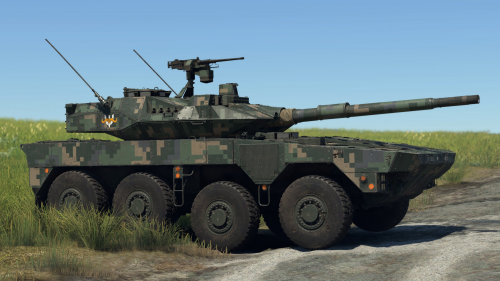
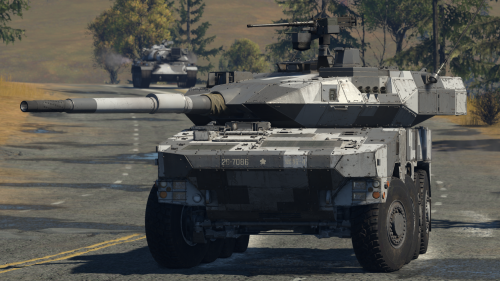
- Videos
See also
Links to the articles on the War Thunder Wiki that you think will be useful for the reader, for example:
- reference to the series of the vehicles;
- links to approximate analogues of other nations and research trees.
External links
| Japan light tanks | |
|---|---|
| Type 89 | I-Go Ko |
| Type 95 | Ha-Go · Ha-Go Commander |
| Type 98 | Ke-Ni |
| Other | Ka-Mi |
| IFV | Type 89 |
| RCV | Type 87 RCV (P) · Type 87 RCV · RCV (P) |
| MCV | Type 16 (P) · Type 16 (FPS) · Type 16 |
| USA | ▅M24 · ▅M41A1 |


